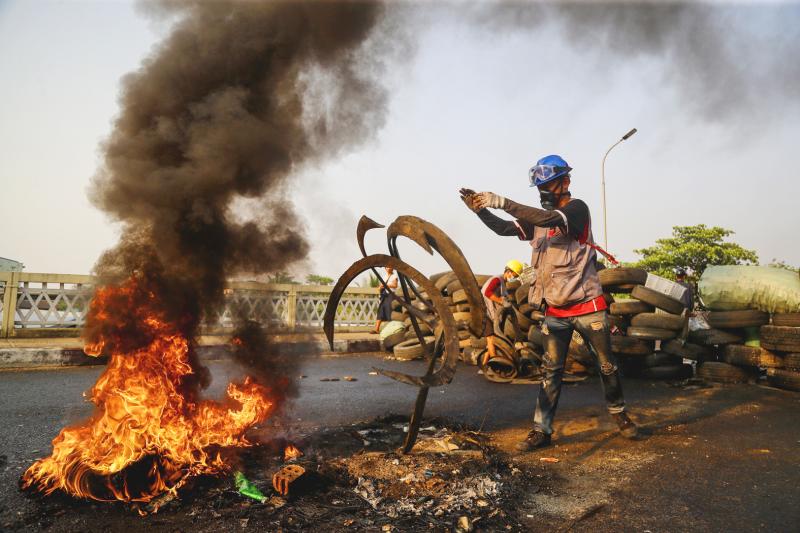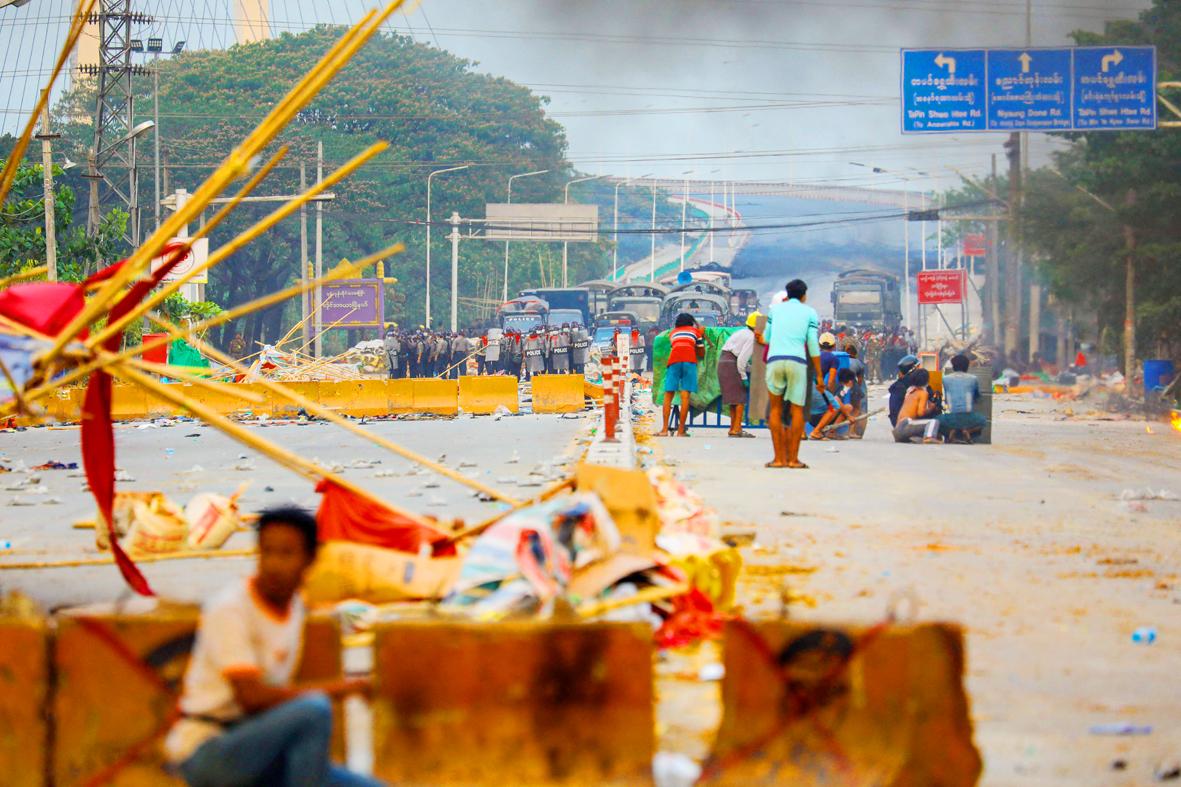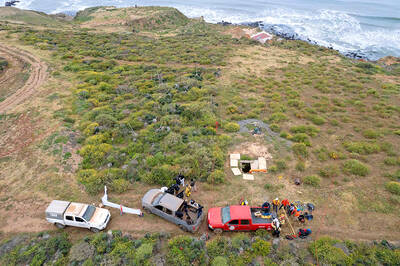Plumes of smoke yesterday rose above a part of Myanmar’s biggest city that has turned into a battle zone, with burning barricades and security forces firing at unarmed protesters to enforce martial law.
Traumatized residents have fled the industrial neighborhood in Yangon that has become one of the flashpoint sites in a nationwide uprising against the Burmese military’s coup nearly seven weeks ago.
The junta has increasingly deployed heavier force to quell the demonstrations, with more than 200 protesters reported to have been killed in the crackdown.

Photo: EPA-EFE
Sunday was the deadliest day since the coup, with a monitoring group documenting more than 70 people killed — the bulk of them in Yangon’s Hlaingthaya Township.
The junta imposed martial law on Hlaingthaya and later on other protest hotspots — effectively placing nearly 2 million people under complete control of military commanders.
Residents — many of them migrant workers — have since fled to their home states, piling their belongings and families onto flat-bed trucks and the backs of motorcycles.

Photo: AFP
Those who stayed reported scenes akin to war.
“There was constant gunshots the entire night, and we didn’t get to sleep,” one resident said, adding that people were worried about even walking on the streets for fear of getting targeted by security forces.
“Currently there are very few people out on the streets,” the resident added.
Protesters on Tuesday evening camped on a bridge leading to the township’s main roads, wearing hard hats and gas masks, and carrying shields. They had also erected barricades made of tires, wood, sandbags and bamboo poles.
Some of those barricades were burnt, causing heavy black smoke to rise above the mostly deserted streets.
Some protesters threw Molotov cocktails at security forces, but otherwise appeared defenseless as they hid behind makeshift shields.
In a residential area of a neighboring township, video footage verified by Agence France-Presse showed volleys of gunfire going non-stop for about 15 seconds.
Information on arrests and violence have been trickling out of the conflict areas on social media — the flow slowed due to the junta’s throttling of mobile Internet data.
Residents in much of Myanmar have not been able to use their mobile Internet since the early hours of Monday. The country is also placed under a nightly Internet shutdown for eight hours.
More than 200 people have died in the unrest, local monitoring group Assistance Association for Political Prisoners said.
The UN on Tuesday again condemned the deaths in Myanmar, adding that it was worried about reports of torture and deaths of those in custody.
“The death toll has soared over the past week in Myanmar, where security forces have been using lethal force increasingly aggressively against peaceful protesters,” UN Human Rights Office spokesperson Ravina Shamdasani told reporters. “Deeply distressing reports of torture in custody have also emerged.”
The office had determined that “at least five deaths in custody have occurred in recent weeks,” she said, adding that “at least two victims’ bodies have shown signs of severe physical abuse indicating that they were tortured.”

MONEY MATTERS: Xi was to highlight projects such as a new high-speed railway between Belgrade and Budapest, as Serbia is entirely open to Chinese trade and investment Serbian President Aleksandar Vucic yesterday said that “Taiwan is China” as he made a speech welcoming Chinese President Xi Jinping (習近平) to Belgrade, state broadcaster Radio Television of Serbia (RTS) said. “We have a clear and simple position regarding Chinese territorial integrity,” he told a crowd outside the government offices while Xi applauded him. “Yes, Taiwan is China.” Xi landed in Belgrade on Tuesday night on the second leg of his European tour, and was greeted by Vucic and most government ministers. Xi had just completed a two-day trip to France, where he held talks with French President Emmanuel Macron as the

With the midday sun blazing, an experimental orange and white F-16 fighter jet launched with a familiar roar that is a hallmark of US airpower, but the aerial combat that followed was unlike any other: This F-16 was controlled by artificial intelligence (AI), not a human pilot, and riding in the front seat was US Secretary of the Air Force Frank Kendall. AI marks one of the biggest advances in military aviation since the introduction of stealth in the early 1990s, and the US Air Force has aggressively leaned in. Even though the technology is not fully developed, the service is planning

INTERNATIONAL PROBE: Australian and US authorities were helping coordinate the investigation of the case, which follows the 2015 murder of Australian surfers in Mexico Three bodies were found in Mexico’s Baja California state, the FBI said on Friday, days after two Australians and an American went missing during a surfing trip in an area hit by cartel violence. Authorities used a pulley system to hoist what appeared to be lifeless bodies covered in mud from a shaft on a cliff high above the Pacific. “We confirm there were three individuals found deceased in Santo Tomas, Baja California,” a statement from the FBI’s office in San Diego, California, said without providing the identities of the victims. Australian brothers Jake and Callum Robinson and their American friend Jack Carter

CUSTOMS DUTIES: France’s cognac industry was closely watching the talks, fearing that an anti-dumping investigation opened by China is retaliation for trade tensions French President Emmanuel Macron yesterday hosted Chinese President Xi Jinping (習近平) at one of his beloved childhood haunts in the Pyrenees, seeking to press a message to Beijing not to support Russia’s war against Ukraine and to accept fairer trade. The first day of Xi’s state visit to France, his first to Europe since 2019, saw respectful, but sometimes robust exchanges between the two men during a succession of talks on Monday. Macron, joined initially by EU Commission President Ursula von der Leyen, urged Xi not to allow the export of any technology that could be used by Russia in its invasion